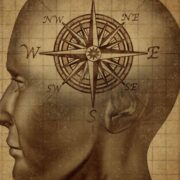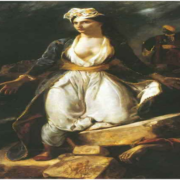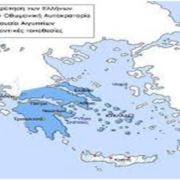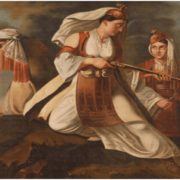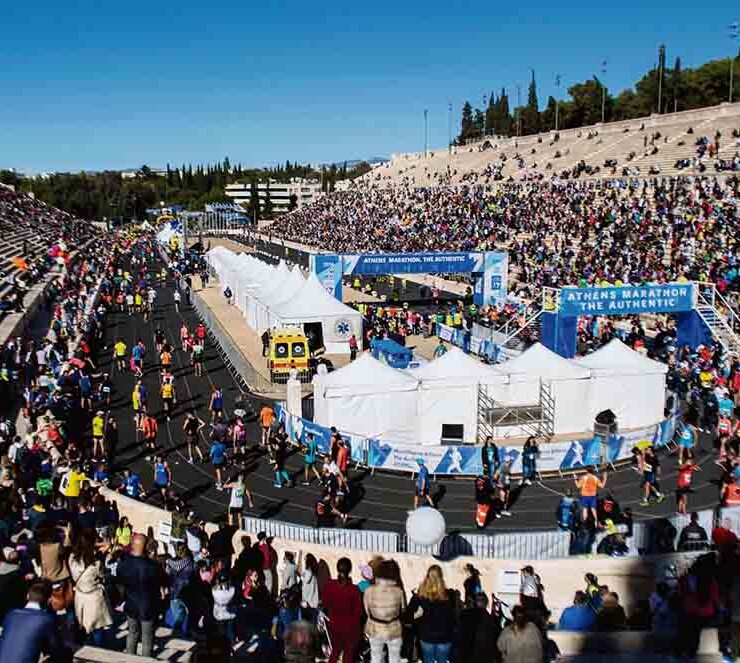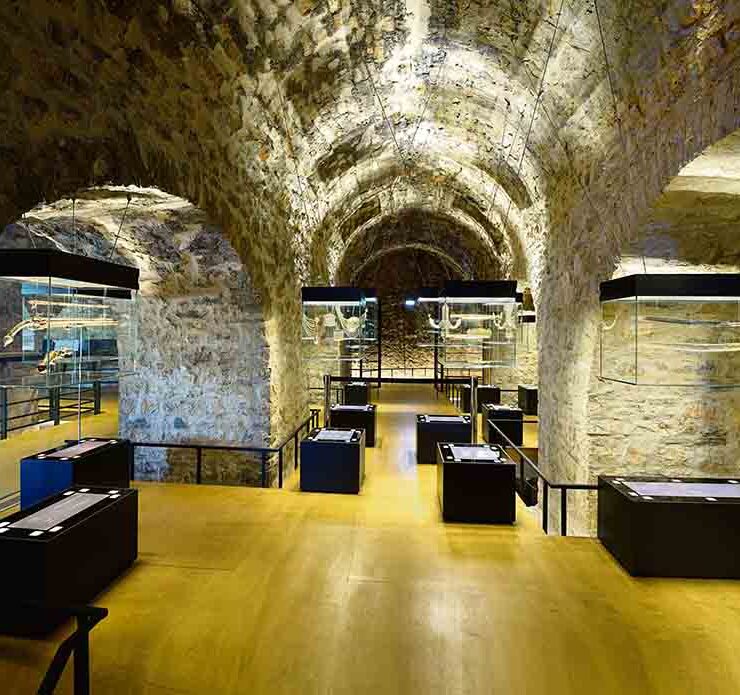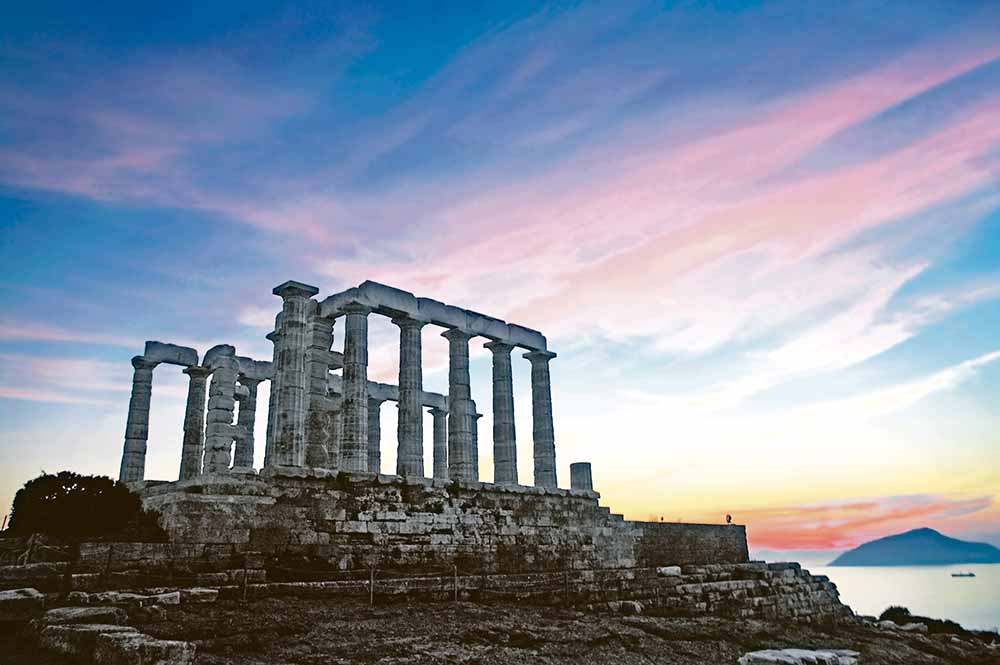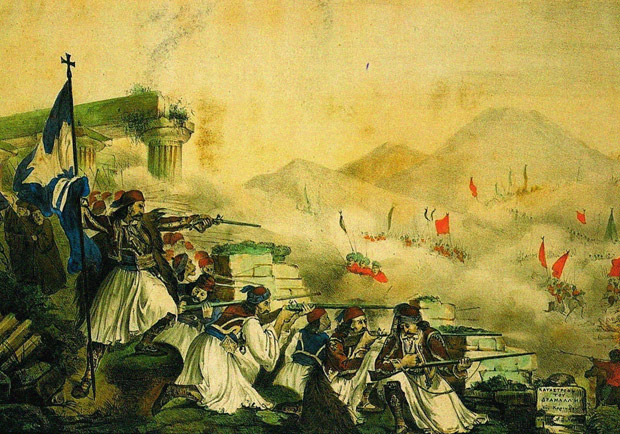
Read Next
The Greek War of Independence of 1821
“Greece in the ruins of Messolonghi”, a famous painting by Eugene Delacroix, a great French painter and active Philhellene. Greece is depicted as a wonderful woman, a soul and life fighter, fighting not just for for life, but also for the honor and dignity of us all.
The Greek War of Independence of 1821
Initially, the Modern Greek state was only the Peloponnese and a small strip of land in Central Greece (according to a French plan for an autonomous Peloponnese but without the demographic changes) and the Cyclades. With the ongoing bloody fights a greater part of Central Greece and the whole of the Peloponnese are gradually liberated. Furthermore, Euboea is exchanged for the Dodecanese (part of it) and a further shifting of the borders to the north is sought in order for the new state to be relatively sustainable. It should be emphasised that Kapodistrias and the Philhellenes did not accept simple Autonomy.
The Greek War of Independence of 1821
The Souliotes, a local community in Epirus, had organized a small “federal state” which claimed for centuries its autonomy against the Ottoman state and the local rulers, until its subjugation and total destruction (1803). The “Dance of Zalongo” a “legend” based on a historical fact (1803), performed by the proud and untamed Souliotisses and their brothers in arms, who chose martyrdom over disgrace, will remain eternal as insurmountable symbols of heroism, bravery, original patriotism and martyrdom
The Greek War of Independence of 1821
Count Ioannis Kapodistrias (1776) who came from a leading noble and politician Corfiot family, as a Provisional Governor of Greece, sought from the very beginning the accession and integration of Cyprus into the newly established National State, not only because his mother was a Cypriot, but also because Cypriot Greeks participated actively in the Greek Revolution. Kapodistrias both orchestrated the Revolution, in his own way, within the framework of the Vienna Convention, until his end, and promoted the political, ideological and geopolitical plan of the Great Idea. Unfortunately, he was assassinated in Nafplion, on 27th September (9th October 1831).
Historical Reflective Approaches and Concerns
Nations, societies, communities, but also people, both individually and collectively, seek and decide to reflect on their past at any given opportunity, but, in essence, they contemplate on their immediate present which tends to transform rapidly and relentlessly into future. Obviously, the modern, post-modern Hellenism of the 21st century could not be an exception to this rule.
Indeed, based on the occasion of the forthcoming 200th anniversary of the start of the Greek War of Independence in 1821 (25th March 2021), which greatly contributed to the formation of the modern European Greek nation, a flashback to historical events that took place during the recent years of the European history (16th-20th century), which, up to an extent, influenced, prepared and also expedited the procedures that led to the Greek Revolution on the one hand, and , on the other, in essence, a broader, reflective approach of everything that arose before, during and also after the Liberation, and highlighted, in one way or another, the virtues, passions and weaknesses of the Greeks, as well as those dark moments in the Modern Greek history, in general, perhaps in order to learn from everything that marked and determined the course of the Greek Nation.
Trying, therefore, to trace the paths of the Greek history from antiquity up to the present, useful and beneficial moral lessons emerge, which, as the case may be, have some common features in the so-called eras of prosperity, crisis and decline.
Many, and quite rightly, believe that in times of prosperity, Hellenism tended to be based on enviable elements, such as the will to fight for a cause, generousity, participation and joint action. Indeed, believing in the rightness of their fights, armed with hope, memory, tradition, a communal and collective conscience, gaining progress, freedom and more power. However, when discord and division play the dominant role, springing from sterile individualism, personal interests and moral corruption, then any kind of prosperity, at cultural, intellectual and political level enters a phase of crisis, or even worse, decadence. However, at its critical point it is realized by the people and their responsible, trustworthy groups, who seek to reverse this situation of gradual collapse so that they can enter again a new form of progress, prosperity and creation.
These historical timeless regressions became apparent through the successive phases of its evolution, from the Archaic and Classical period to the colourful Hellenistic, then to the Roman- Byzantine, until the time of the Ottomans.
In particular, after centuries of Ottoman rule and dozens of attempts (usually local and short-lived) for national, religious, cultural and political self-determination, came the critical period of the pre-revolutionary years of the 17th and 18th century, when it became more powerful due to both internal and external reasons, such as the role of the Great Powers and Hellenism throughout the Balkan Peninsula, the Aegean Archipelago and its islands, the Black Sea, Asia Minor and the Near East Region.
So, through various phases of struggles, mainly dating from the pre-revolutionary period, 1770 and onwards, Hellenism gradually acquired a form of national, political, diplomatic, ecclesiastical, social, cultural and financial self-management, autonomy and independence. It is obvious that, as long as the struggles are based on the sacrifice, generousity, cooperation and ambitious efforts of the many, then the results are quite positive for everyone.
However, when sterile individualism, trade union interests, party ideologies and confrontation between conservative, liberal and radical forces seem to prevail, it is a natural consequence for Hellenism and its culture to be in a state of crisis, disintegration or decline, as it would happen to any nation, any culture that does not seem to be interested in self-protection and self-development.
Probably, all the above have a special significance to the Greek Nation, since there are, among a number of others, two vital, existential and essential reasons. On the one hand, that Hellenism is one of the historical cultures, and, on the other, that it is located in a key geostrategic, geopolitical and geo-economic hub and, as a result, is influenced and affected mentally, morally, religiously, culturally, geopolitically and geo-economically.
Within this framework, as it was briefly mentioned above, the great struggle of 1821 began, through the titanic efforts of Adamantios Korais in revolutionary France, the actions and sacrifice of Rigas Feraios and his comrades, the continuous efforts of the prosperous Parochial Hellenism and the actions of the ‘Philiki Etaireia’ (Friendly Society) and other related secret revolutionary organizations and Networks in Greece, in the Ionian and Aegean Islands, on Crete and Cyprus, as well as in the Danube Hegemonies (Moldavia and Wallachia), the Russian Empire of the Tsars, the Italian states, the territory of the German states and Hegemonies, the Empire of the Habsburgs, in France and in Great Britain.
Thus, in the aftermath of all those critical, both positive and negative developments, and despite endogenous difficulties that were encountered during the preparation of the Revolution of 1821, and with the attitude of the Great Powers being characterized, at the very least, ambiguous, the actions and sacrifices of ardent patriots, pure hearted Greeks and Philhellenes worldwide, result in hope and bear positive results. In essence, this is how the armed struggle against the tyrants, the Ottomans/Turks begins in a more organized way, primarily with a national liberation character but also a socio-religious one, from all those who believed in Freedom and the righteous Cause of the Revolution, as it was emphatically expressed in the pioneering and liberal revolutionary Constitutions, deeply influenced by the American Declaration of Independence (4th July 1776) and the French Declaration of the Rights of Man and Citizen (1789).
All those revolutionary efforts and actions will be imprinted in the historical subconscious of the Greeks, who will express themselves both individually and collectively by participating in the armed struggle inspired by the heroic figures of the pure Fighters and Patriots, known and unknown. They will shock the souls of the enslaved Greeks and also of the Philhellenes worldwide, thus intensifying their will, their fighting spirit, their contribution of all kinds to the Revolution and their collective participation in order to achieve their liberation. It is there, where among other things, the heroic model of the eponymous and anonymous Greek woman fighter will emerge and gain recognition and will become a symbol of militancy, dynamism and original patriotism.
And while on the battlefield heroism, sacrifice, voluntary action at all levels and self sacrifice prevail, the revolution will show strong symptoms of disintegration, decline and deconstruction on a strategic, political and social level, due to the acute interpersonal, social class, political and ideological contradictions among various fractions and groups, resulting in the manifestation of controversies, disputes and discords and even Civil War within the emerging modern Greek society, at times cruel and violent. Driven by personal ambitions and humble interests at a historically critical and decisive moment of the Revolution, indicative of the complete lack of national and political ethics and responsibility, as well as of intense social, local economic and ideological differences which, although tragic, fortunately did not affect the final outcome of the Revolution, but, nevertheless, had almost destructive consequences later on in the transforming Greek state.
In spite of all these tragic Civil War situations, in one way or another, a conditional “compromise” will be reached between the warring parties, however, not so “peacefully”, and this, either by force or by temporarily setting aside their differences, they will join forces on a political, military, economic, ideological, religious and diplomatic level, in order to persevere in their Revolution and the national interest, while the armed intervention of the Great Powers proved decisive for its final outcome, concerning the destruction of the Turkish-Egyptian fleet in the Battle of Navarino (1827), while later on the great Russo-Turkish war broke out (1828). These circumstances, in combination with the political, diplomatic and military plans and actions of Governor Ioannis Kapodistrias and the Philhellenes, signalled the beginning of the Independence and sovereignty of the newly formed Greek state, albeit territorially limited and powerless, politically, economically and militarily (Protocol of London, 1830).
Evaluating briefly the fact of an organized revolution and not a spontaneous riot of the Greek nation and the conditions that contributed to the relatively successful outcome of the Revolution, it can be said that the European and Modern Greek Enlightenment, the pervasive Philhellenism, the efforts for liberalization and democratization, as well as the noble and ambitious aspirations for the protection of human rights, played an important role, without exception, all put together.
Armed with rationality, the need for social and economic justice and the fight against all sorts of fanaticism, dogmatism and stereotypes, the modern Greek society, from 1821 until today, has accomplished a lot, but its efforts to expand its achievements and control its various deficiencies (intellectual, scientific, technological, etc) need to be intensified in our modern times, in a new world of cosmogenic and tectonic changes.
In final analysis, wisdom and rationalism impose that what should prevail is the preservation of our unity and the protection of our national interests, at all levels. For this reason, our gratitude to the martyrs and freedom fighters will be eternal but not pretentious.
Let us then learn from their achievements and sins, equally and in balance. Indeed, the Revolution should serve the current needs of the nation, for lessons to be learnt, exemplification, prudence and modern political thinking, in order to trigger a creative stream of new efforts, struggles and high expectations as a Nation, as a society and as people, so that Greece can regain its leading role, in a period of intense national, social and economic challenges.
Sign Up to Our Newsletter
Get notified about exclusive offers every week!
What's Your Reaction?
 PIN IT
PIN ITBrigadier of the Greek Army – Analyst


